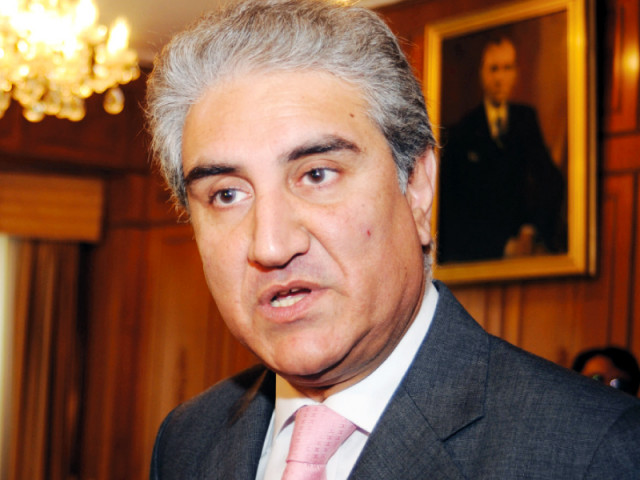Pakistan wishes to peacefully resolve Kashmir issue: Qureshi
Says India must create an enabling environment for a result-oriented dialogue

Pakistan wishes to resolve all outstanding issues with India, including the core issue of Jammu and Kashmir dispute, through peaceful means, Foreign Affairs Minister Shah Mehmood Qureshi stated in a reply in the National Assembly on Friday.
“For this to happen, India must create an enabling environment for a result-oriented dialogue to take place,” he stated.
The details regarding the peaceful solution to Kashmir dispute emerged in a written reply of the foreign minister during the question-hour session in the National Assembly.
Qureshi noted that improving bilateral ties with the South Asian countries remained a priority of Pakistan’s foreign policy.
“In line with Prime Minister Imran Khan’s vision of a ‘Peaceful and Friendly Neighbourhood’, Pakistan is pursuing the policy of good relations with all the countries in the region, while upholding the principles of the UN Charter,” he stated in the reply.
“The salient features of our foreign policy include active political interactions, respect for sovereignty and territorial integrity, non-interference in the internal affairs, non-aggression and peaceful settlement of disputes, safeguarding national security and geo-strategic interests, including Kashmir, consolidating economic cooperation, and effective cooperation with South Asian countries at regional and international fora,” he added.
The reply came in response to Pakistan Tehreek-e-Insaf (PTI’s) MNA Nusrat Wahid’s questions regarding the salient features of government’s foreign policy and steps taken to address the regional security situation.
Qureshi observed that Pakistan had taken a momentous step by opening the Kartarpur Corridor and releasing the captured Indian pilot after New Delhi’s misadventure in Balakot, as a peace gesture, despite the hostile attitude of the neighbouring country.
Shedding light on the “illegal and unilateral Indian actions of August 5, 2019”, the foreign minister maintained that the Indian attempts to change the demographic structure of Indian occupied Jammu and Kashmir (IOJ&K) was in stark violation of international law and relevant United Nations Security Council resolutions.
He observed that serious human rights violations and humanitarian crisis in IOJ&K had vitiated the environment.
Qureshi informed the parliamentarians that “India has also escalated tensions at the LoC/Working Boundary (WB) in an attempt to divert international attention from the Indian state-terrorism and egregious violations of human rights in IOJ&K.”
“Pakistan continues to sensitise the world community, including the United Nations, about the threat to peace and security posed by India’s belligerent rhetoric and aggressive actions on the ground that include the intensified ceasefire violations on the Line of Control,” he said.
“We also continue to expose Indian atrocities at all levels, including the UN Human Rights Council (UNHRC). Through continuing restrictions, excruciating military crackdown, extra-judicial killings, arbitrary detentions and incarcerations, India seeks to perpetuate its illegal occupation of IOJ&K,” he added.
Highlighting the government’s efforts, the foreign minister said that Pakistan had continuously been apprising the international community about the risks of New Delhi’s “false-flag” operation which was meant to divert the attention from domestic criticism of the Indian government.
“Pakistan does not want escalation but any Indian aggression or misadventure will be responded to effectively and with full national resolve,” he stated.
On Afghanistan issue, the foreign minister observed that “Pakistan believes that the economic potential of the region cannot be realised without a peaceful and stable Afghanistan.”
Underlining the country’s commitment to a peaceful, stable, united and prosperous Afghanistan, Qureshi reminded that Pakistan had facilitated direct talks between the United States and Taliban, which culminated in the peace agreement signed in Doha on February 29, 2020.
“Pakistan has always maintained that the only solution to the Afghan conflict is a politically negotiated settlement, which is Afghan-led and Afghan-owned,” he said, while welcoming the announcement of agreement between President Ashraf Ghani and Dr Abdullah Abdullah, formation of negotiation team and High Council of National Reconciliation.
He stressed on the Afghan leadership to keep focus on holding the intra-Afghan negotiations and its successful completion and not let the talks be derailed by “spoilers” who do not want to see peace and stability in the country and region.
Qureshi underscored that the government was taking steps to develop friendly relations and enhance diplomatic engagements with the South Asian countries based on equality and forward-looking approach.
“Pakistan has always played a proactive role in making SAARC a useful vehicle for regional cooperation, based on the principle of sovereign equality,” he concluded.



















COMMENTS
Comments are moderated and generally will be posted if they are on-topic and not abusive.
For more information, please see our Comments FAQ